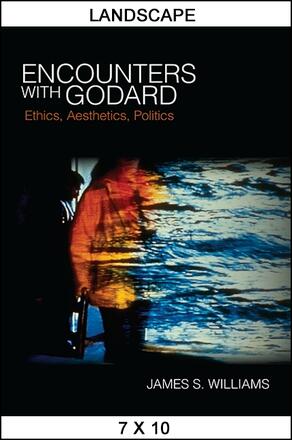
Encounters with Godard
Ethics, Aesthetics, Politics
Alternative formats available from:
A wide-ranging and accessible approach to Godard’s later work, and a major intervention in the study of film and ethics.
Description
Encounters with Godard takes the reader on a personal voyage into the sensory pleasures and polyphonic rhythms of Jean-Luc Godard's multimedia work since the late 1970s, from his feature films and video essays to his published writings, art books, and media performances. Godard, suggests James S. Williams, lays ethical claim to the cinematic, defined in the broadest terms as relationality and artistic resistance. An introductory chapter on the extended history of La Chinoise (1967), a film explicitly of montage, is followed by seven different types of critical encounters with Godard, encompassing the fields of art and photography, music and literature, and foregrounding themes of gender and sexuality, race and violence, mystery and emotion. The Godard who emerges here is a restless and radical experimenter who establishes new cinematic thresholds through new technology and expands the creative potential and free exchange of the archives. Williams examines works including Nouvelle vague (1990), Film socialisme (2010), Hélas pour moi (1993), and the magnum opus Histoire(s) du cinéma (1988–98). Wide-ranging and accessible, Encounters with Godard marks a major intervention in the study of film aesthetics and ethics while forging a vital dialogue with literature, history and politics, art and art history, music and musicology, philosophy, and aesthetics.
James S. Williams is Professor of Modern French Literature and Film at Royal Holloway, University of London. His books include Space and Being in Contemporary French Cinema; Gender and French Cinema (coedited with Alex Hughes); and The Erotics of Passage: Pleasure, Politics, and Form in the Later Work of Marguerite Duras.
Reviews
"…a scholarly tour de force that opens up Godard's polymorphous oeuvre to far-reaching historical, political, aesthetic, and philosophical scrutiny … This is an indispensable contribution to Godard studies, attractively produced, and exhaustively referenced. " — French Studies
"A landmark contribution to our understanding of Godard and of modernist expression as a whole. " — David Sterritt, author of The Films of Jean-Luc Godard: Seeing the Invisible
"Writing with a delirious lucidity, Williams opens Godard to debate and dialogue that informs, extends, opens, and illuminates what may be the greatest and most complex body of cinema of the last half-century. " — Tom Conley, author of Film Hieroglyphs: Ruptures in Classical Cinema